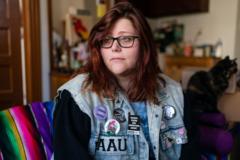In a significant move ahead of the annual March for Life rally, President Donald Trump has pardoned 23 anti-abortion activists convicted for actions related to obstructing a reproductive health clinic. Among those pardoned is Lauren Handy, a prominent figure in the anti-abortion group Progressive Anti-Abortion Uprising (PAAU), who was convicted for her involvement in a 2020 blockade that resulted in injuries.
During the signing of the pardons, Trump labeled the convictions as "ridiculous," suggesting that the activists, many of whom are elderly, should never have faced prosecution in the first place. This pardon announcement came just a day prior to the March for Life, where Trump is expected to address participants via video link.
The March for Life has been a recurring event in Washington DC since 1974, emphasizing the anti-abortion agenda following the landmark Roe v. Wade decision. In 2020, Trump became the first sitting president to physically attend the rally, although former presidents have addressed it through remote means.
Supporters of the pardoned activists have expressed gratitude towards Trump, asserting that the convictions were politically motivated. Marjorie Dannenfelser, president of Susan B Anthony Pro-Life America, claimed that the protesters were unjustly targeted by the administration of President Joe Biden.
Conversely, abortion rights advocates assert that the pardons underscore Trump's full alignment with anti-abortion principles. They argue that his actions contradict his prior stance during the presidential campaign where he expressed that abortion regulation should be left to individual states. Ryan Stitzlein from Reproductive Freedom for All remarked, "We never believed that was true, and this shows us that we were right."
As the debate over abortion rights continues to intensify, Trump's pardons serve as a clear signal of his administration's stance on the issue and its impact on ongoing dialogues surrounding reproductive health access in the United States.
During the signing of the pardons, Trump labeled the convictions as "ridiculous," suggesting that the activists, many of whom are elderly, should never have faced prosecution in the first place. This pardon announcement came just a day prior to the March for Life, where Trump is expected to address participants via video link.
The March for Life has been a recurring event in Washington DC since 1974, emphasizing the anti-abortion agenda following the landmark Roe v. Wade decision. In 2020, Trump became the first sitting president to physically attend the rally, although former presidents have addressed it through remote means.
Supporters of the pardoned activists have expressed gratitude towards Trump, asserting that the convictions were politically motivated. Marjorie Dannenfelser, president of Susan B Anthony Pro-Life America, claimed that the protesters were unjustly targeted by the administration of President Joe Biden.
Conversely, abortion rights advocates assert that the pardons underscore Trump's full alignment with anti-abortion principles. They argue that his actions contradict his prior stance during the presidential campaign where he expressed that abortion regulation should be left to individual states. Ryan Stitzlein from Reproductive Freedom for All remarked, "We never believed that was true, and this shows us that we were right."
As the debate over abortion rights continues to intensify, Trump's pardons serve as a clear signal of his administration's stance on the issue and its impact on ongoing dialogues surrounding reproductive health access in the United States.




















